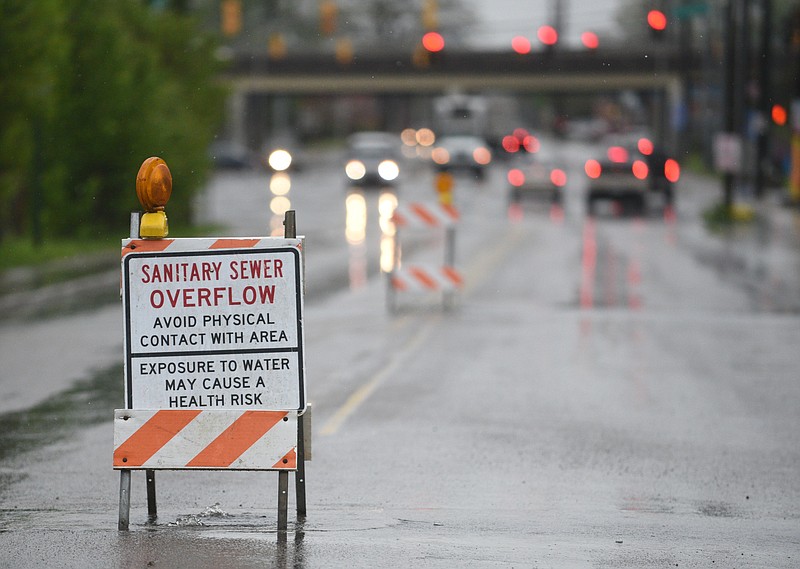Chattanooga and the county sewer authority will borrow more low-interest loans from the state to pay for upgrades to local sewage systems needed to open up areas for more development and comply with water quality regulations.
The city applied for an $18.1 million loan for three projects that will improve its solid treatment process and add sewer storage tanks across from the proposed visitor center to the Moccasin Bend Archaeological District.
Meanwhile, the Hamilton County Water and Wastewater Treatment Authority (WWTA) plans to borrow close to $9 million to fix up its sprawling sewage system - primarily near Exit 1 in East Ridge, which is the site of a new Bass Pro Shops-anchored shopping center that's been hamstrung by a sewer moratorium that's limited commercial development there.
While both the city and WWTA could borrow on their own, Tennessee's Clean Water State Revolving Fund Loan, administered by the state Department of Environment and Conservation through the U.S. Environmental Protection Agency, has an interest rate of only 1.45 percent and forgives the first $100,000 of the loan, officials said Tuesday.
"It makes very good financial sense for the city to take out these types of loans to fund their capital improvement program," Program Manager Michael Marino said, explaining why the city went with the loan over bonds.
It is the fourth loan the city has used to comply with a consent decree negotiated with the Environmental Protection Agency in 2012, and it won't be the last. The latest projects are the beginning steps of a larger overhaul to the city's aging system.
"As we're getting through the bulk of the consent decree projects, we're starting to rehabilitate other aspects of the waste resource department's capital improvement program," Marino said.
The consent decree was a result of the city's outdated sewer system that wasn't equipped to handle the 26 billion gallons of sewage flowing into the city each year. Phase 1 of the project must be met by the summer of 2020. The second, and final, phase will take an additional 10 years.
The project to add sewer storage tanks is a direct result of the decree and will fix the West Bank Overflow, which dumps storm and sewage water into the Tennessee River during storms.
"It's a necessary evil," Kevin Womack, who owns property near the wastewater treatment facility on Moccasin Bend, said. "It's got to be done, but it's got to be done with a conscious effort to understand the growth of the city."
Steve Holmes, who lives near Womack's property and was concerned about the tanks' impact on the area, echoed that statement.
"It has to be done," he said.
City residents will be hit with a 9.8 percent rate increase effective Oct. 1. It was approved by city council June 21, 2016. This loan was factored into the increase, so there will not be an additional rate hike.
WWTA customers also can expect their sewer bills to increase on Oct. 1 by 9.8 percent.
"We try to keep our rate comparable to the city in order to try to keep things equitable," WWTA Executive Director Mark Harrison said.
The WWTA plans to apply for $7.31 million from the state of Tennessee's Clean Water State Revolving Fund to perform sanitary sewer investigation, design and rehabilitation services for the sanitary sewer basins located in the city of East Ridge. The project consists of performing trenchless rehabilitation of approximately 22,000 feet of sewers and rehabilitating 1,800 vertical feet of manholes located throughout the eastern portion of the city of East Ridge near I-75's Exit 1.
The work will help with plans to develop Exit 1 in East Ridge, where the Vision Hospitality Group Inc. is now building an 88-room Hampton Inn on the site of a former motel - the America's Best Value Inn near Camp Jordan - so the former hotel's sewage capacity can be credited toward the new Hampton Inn.
The WWTA also will seek $1.56 million in state low-interest loans for investigations (manhole inspections, smoke testing, and closed-circuit television inspection) on sanitary sewers in East Ridge, Lookout Mountain, Red Bank, Signal Mountain and unincorporated areas in Hamilton County. WWTA will inspect 973 manholes located within these areas and do smoke testing and closed-circuit television investigation of approximately 184,000 feet of sanitary sewers.
Results of the investigations will be used to plan additional rehabilitation projects.
"There's a great deal of work to be done in our service areas," Harrison said.
WWTA says the goal of all of the projects is to identify sources of rainwater entering the sanitary sewer collection system and overwhelming the sewers during storms.
Contact Mark Pace at mpace@timesfreepress.com or Tim Omarzu at tomarzu@timesfreepress.com.
